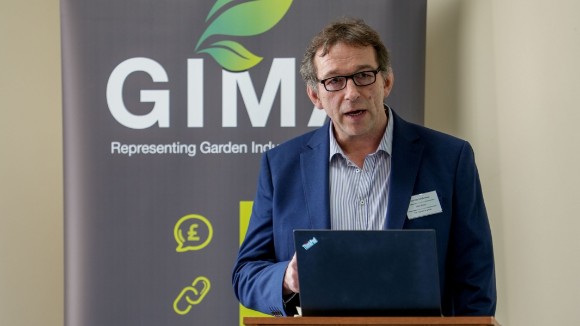Navigating the current challenges in garden retail
Retail and economic challenges, sustainability, and adaptation to changing market dynamics were just some of the key topics that were explored at the annual GIMA Day Conference, which took place at Horticulture House, Chilton on 14th March.
The event saw the day split into key themes that brought together industry leaders, experts, and GIMA members to explore the latest trends, challenges, and opportunities shaping the garden industry.
Market & Retail Outlook
The conference kicked off with David Denny, Director of Research and Insights at HTA, who delved into market predictions and trends in the horticulture sector. Dave highlighted the increase in rental properties and how it will change the style of gardening for the younger generation. He also spoke about the emergence of a new breed of influencers among older consumers on TikTok, the importance of integrating health and wellbeing into garden centre marketing, and the significance of embracing inter-generational opportunities, with new gardeners now sourcing information from parents and family.
Mark Whiteley from GIMA Associate member Xenia Broking and Fiona O’Brien from Tokio Marine HCC provided members with essential insights into credit insurance and a retail sector update. Fiona revealed that retail sales have continued to decline over the past 10 years, with sales volumes at their lowest since pre-pandemic in 2018. January saw a sales recovery from December and was up by 3.4% but consumers continue to be pessimistic with their spending. Among the key takeaways were the continued dominance of online spending, declining inflation amidst challenging retail conditions, and market suppression challenges.
Jack Cooper, Commercial Director at RT7 Digital, shed light on the evolving landscape of e-commerce, emphasising the increasing importance of platforms like Amazon for product research and the transition from one to multi-channel vendor strategies. With 59% more searches now made on Amazon than Google, Jack revealed that the garden and outdoors category is worth on average a staggering £99.63 million a month and gave key considerations when setting up an Amazon channel.
Sustainability and the Journey to Net Zero
The mid-morning sessions delved into sustainability initiatives within the industry, with Mike Burks from The Gardens Group sharing his strategies for minimising environmental impact in his three garden centres. He highlighted the importance of selling ranges, including Christmas in an environmentally sound way and how his buying team prioritises natural products, made from recycled material that are locally made before anything else. This buying process saw the Garden Group see a 16% increase in sales compared to a 5% industry increase in 2023, and Mike urged how businesses must adopt sustainable buying policies.
Ben Duckworth from Greenarc, also an associate member of GIMA, provided insights into reducing carbon impact and cultivating change within businesses, touching upon net zero objectives that must be achieved by 2050, green technologies and the significance of having an Environmental, Social, and Governance (ESG) policy. He went through the Net Zero scopes, 1,2 and 3 which involve direct emissions, indirect emissions from purchased energy with the hardest being the emissions across the business chain.
The conference concluded with a dynamic member GIMA panel debate, offering shared insights and addressing current challenges faced by manufacturers in the garden industry. Guy Jenkins from Johnsons Lawn Seed, Jenny Douthwaite from Primeur, David Halsey from Maze and Matt Jones at Sipcam covered topics such as credit risk management, sustainability initiatives within the business, Extended Producer Responsibility (EPR), and supply chain issues.
Vicky Nuttall, Director of GIMA said: “In a landscape currently marked by economic shifts and evolving consumer behaviours, the annual GIMA Day Conference highlighted the challenges, and resilience in the garden industry. From navigating retail challenges to embracing sustainability, the industry continues to transform. I would like to thank the speakers, associate members and delegates for their time and hope the insights gained will guide and support GIMA members in their quest for future growth.”

